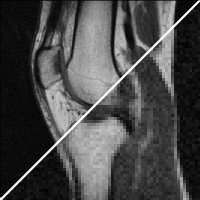Linear estimation in Magnetic Resonance Imaging (MRI)
2009
Master Semester Project
Project: 00183

A recent trend in MRI, is to see imaging as a general inverse problem instead of the more conventional inverse fourier transform. This approach permits a lot of improvements in MRI: better resolution, less artifacts, fast acquisition sequences, improved robustness to noise. All these points represent a great challenge in order to facilitate clinician diagnostic.
The inverse problem point of view allows a large panel of reconstruction techniques. Among them, the linear ones present the advantage to be rapidly performed. This point is critical for real-time applications.
There exist several techniques of linear reconstruction: Wiener, Maximum a posteriori, quadratic regularisation... They all require a prior knowledge and perform the optimal estimate with respect to a certain criterion.
Steps of the project:
- Implement a simple forward model based on the FFT. It will be used after in data simulation and reconstruction.
- Find out the links between classical linear estimators.
- Implement the corresponding reconstruction techniques.
- Compare them in cases where they are not equivalent. We will focus on reconstruction accuracy in presence of noise, which is the crucial point in clinical applications.
- Supervisors
- Guerquin-Kern Matthieu, matthieu.guerquin-kern@epfl.ch, 35142, BM 4.140
- Michael Unser, michael.unser@epfl.ch, 021 693 51 75, BM 4.136